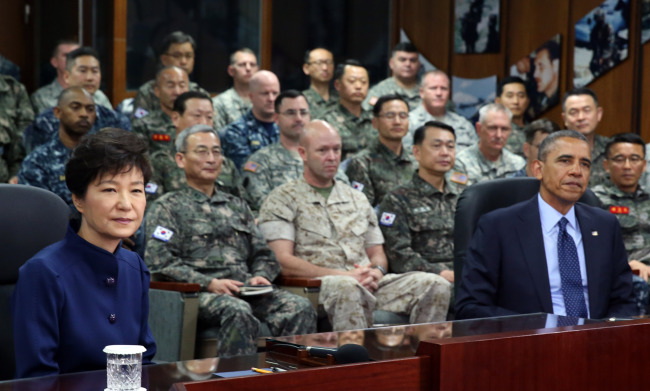South Korean President Park Geun-hye and U.S. President Barack Obama paid a joint visit to the command center for joint military operations between the two allies on Saturday in a symbolic move underscoring their unity in deterring North Korea.
It marks the first time for the leaders of South Korea and the U.S. to make a joint visit to the Combined Forces Command (CFC) since it was established in 1978.
It marks the first time for the leaders of South Korea and the U.S. to make a joint visit to the Combined Forces Command (CFC) since it was established in 1978.

During the visit, the two leaders received a briefing on the countries' readiness against threats from North Korea and vowed to deal sternly with any North Korean provocations based on their firm combined readiness, according to Park's office.
The visit comes a day after Park and Obama agreed that they can reconsider the planned 2015 transfer of wartime operational command of South Korean troops from Washington to Seoul in light of the evolving security environment, including North Korea's nuclear and missile threats.
The two leaders also warned North Korea not to take any provocative steps amid growing concerns that the communist nation is fully ready to conduct a fourth nuclear test. Obama told
Pyongyang: "Threats will get North Korea nothing, other than greater isolation."
The agreement on troop command is considered an expression of Washington's firm security commitment to South Korea and could send a strong message to North Korea at a time of high tensions on the divided peninsula amid growing concerns that the communist nation could carry out yet another nuclear test.
The wartime OPCON over South Korean forces lies with the commander of U.S. Forces Korea, who doubles as head of the CFC. The current USFK commander is Gen. Curtis Scaparrotti. About 28,500 American troops are stationed in South Korea to help defend the Asian ally from North Korea.
Obama arrived in South Korea on Friday from Japan and left for Malaysia around noon Saturday. The final stop of his four-nation Asia tour will be the Philippines.
Before wrapping up his-two day visit, Obama delivered a speech to American servicemembers at Yongsan Garrison, in which he stressed the unwavering U.S. commitment in the region.
"The commitment that the United States of America has made to the security of the Republic of Korea only grows stronger in the face of aggression," Obama said. "Our alliance does not waver with each bout of their attention-seeking. It just gains the support of the rest of the world."
North Korea's continued pursuit of nuclear weapons is a path that leads only to more isolation, Obama said, emphasizing the importance of concerted efforts between the U.S. and South Korea to deter threat posed by the unpredictable communist regime.
"We don't use our military might to impose these things on others, but we will not hesitate to use our military might to defend our allies and our way of life," Obama said, drawing the biggest applause from 1,500 servicemembers gathered at the Collier Field Gym.
"This alliance is special, forged on the battlefield, and it has been fortified by the common values and mutual interest and mutual respect of our people ... The United States and Korea are more than allies -- we are friends."
Earlier in the day, Obama had a breakfast meeting with business leaders of the two countries.
The participants discussed various topics including implementation of the South Korea-U.S. free trade agreement (KORUS FTA), ways to further promote trade and investment between the two countries, and views of Korean investors in the United States, according to the American Chamber of Commerce in Korea, which hosted the meeting.
During the meeting, Obama stressed the importance of growing economic ties between the two countries and pledged to further expand them with the free trade pact.
"Under the KORUS FTA, our trade has increased... We also know that we still have more work to do to fully implement the trade agreement and make sure we are maximizing its benefits, so that companies can compete fairly in autos, intellectual property (IP) and organic foods," he was quoted as saying. (Yonhap)










![[From the Scene] Monks, Buddhists hail return of remains of Buddhas](http://res.heraldm.com/phpwas/restmb_idxmake.php?idx=644&simg=/content/image/2024/04/19/20240419050617_0.jpg&u=20240419175937)



![[From the Scene] Monks, Buddhists hail return of remains of Buddhas](http://res.heraldm.com/phpwas/restmb_idxmake.php?idx=652&simg=/content/image/2024/04/19/20240419050617_0.jpg&u=20240419175937)

![[KH Explains] Hyundai's full hybrid edge to pay off amid slow transition to pure EVs](http://res.heraldm.com/phpwas/restmb_idxmake.php?idx=652&simg=/content/image/2024/04/18/20240418050645_0.jpg&u=20240419100350)

![[Today’s K-pop] Illit drops debut single remix](http://res.heraldm.com/phpwas/restmb_idxmake.php?idx=642&simg=/content/image/2024/04/19/20240419050612_0.jpg&u=)